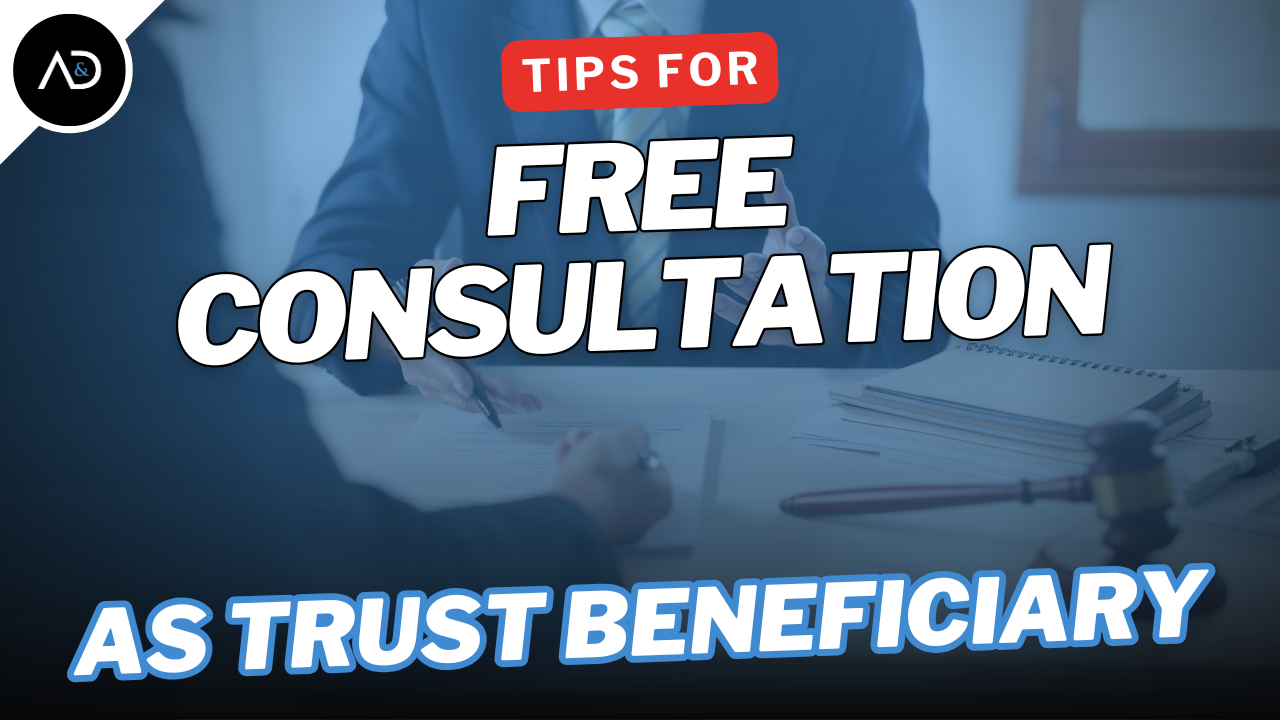
If you’re a beneficiary involved in a dispute over a trust or will, consulting with an attorney is an essential first step. The good news? Many trust and estate attorneys offer free consultations to evaluate your case. However, knowing how to approach that consultation can make all the difference in whether an attorney takes on your case—and how effectively they can help you.
In addition to this blog, watch our video on how to approach a free consultation as a trust beneficiary.
Do Beneficiary Lawyers Offer Free Consultations?
Yes, most probate and trust litigation attorneys offer a free initial consultation. While some still charge a fee, it’s increasingly rare—especially among experienced attorneys with successful practices. Offering free consultations typically signals that an attorney is confident in their ability to assess cases efficiently and isn’t reliant on consultation fees to stay in business.
A free consultation is a good sign: it usually means the attorney is selective and financially stable enough to choose strong cases.
The Consultation Goes Both Ways
A consultation is more than just your chance to get legal advice—it’s also an interview. You’re assessing the lawyer’s experience, approach, and communication style. At the same time, the lawyer is evaluating you and your case.
If you provide only emotional backstory or irrelevant details, you risk burying key facts that could make or break your case. Worse, the lawyer may decide not to take the case based on a lack of clarity or cooperation.
How to Prepare for a Free Legal Consultation
To make the most of your consultation, follow these best practices:
Bring Relevant Information
Focus on specific, time-sensitive facts. For example, if you were removed from a trust shortly before your parent passed away, the most critical details are:
- When the amendment was signed
- Your parent’s mental condition at the time (e.g., dementia, Alzheimer’s, stroke)
- Who was involved in influencing or assisting them
- Your relationship with your parent during the months before and after the amendment
These facts form the core of a potential legal claim. Emotional background or long-standing family feuds are rarely helpful unless they directly relate to undue influence or fraud.
Listen and Respond to the Lawyer’s Questions
The lawyer knows what details matter. Don’t go off on tangents or dominate the conversation. If you ignore the attorney’s questions or ramble through irrelevant history, you may come across as unfocused or difficult to work with—hurting your chances of being taken seriously.
Avoid Rambling Family Drama
Every estate litigation attorney has a story about consultations that went off the rails. Some clients spend the entire meeting discussing childhood conflicts with siblings or unrelated events from decades ago. These stories may be emotionally relevant to you—but are usually legally meaningless.
What the lawyer really wants to know:
- What happened at the time of the disputed event?
- Was the person creating or changing the trust mentally competent?
- Were there suspicious circumstances, such as isolation or undue pressure?
- Are there documents or witnesses that support your concerns?
Example of What a Strong Consultation Looks Like
Let’s say your mother amended her trust three months before she died, removing you as a beneficiary. She passed away six months ago. That makes nine months ago the key time period to examine.
In this case, the lawyer needs:
- The date of the amendment
- Medical records or observations of your mother’s mental health at that time
- Information about who was around her when the change was made
- Any signs of manipulation, isolation, or pressure
You do not need to explain that your sibling never liked you, or recount childhood arguments from 30 years ago. Focus on the facts that support a legal theory, such as lack of capacity or undue influence.
Final Tips for a Successful Free Consultation
A beneficiary lawyer consultation is a critical opportunity to present your case clearly and professionally. Come prepared, stay on topic, and let the attorney lead the conversation based on their expertise. You’ll increase the odds of finding the right legal representation—and building a stronger case from the start.
Key Takeaways
- Most trust and estate lawyers offer free consultations
- Use the meeting to present relevant, focused facts
- Let the lawyer guide the conversation
- Avoid irrelevant family history and emotional tangents
- Your preparation can make or break your case’s first impression
Need help with a trust or estate dispute? Contact Albertson & Davidson, LLP to see if you qualify for a free consultation with our experienced probate litigation attorneys. We hope you can gain valuable info on how to approach a free consultation as a trust beneficiary.


